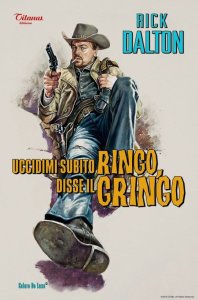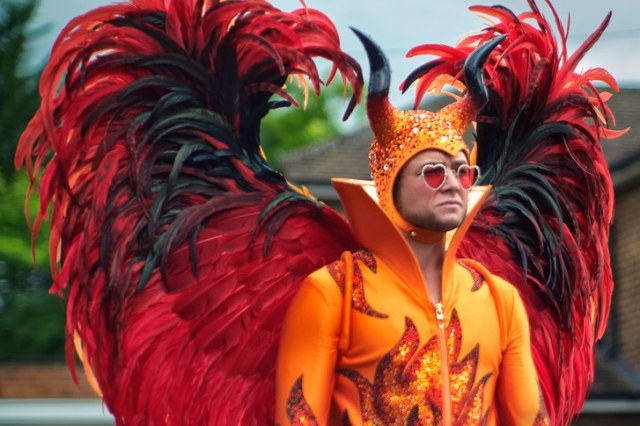Quentin Tarantino. The writer/director’s name inspires all kinds of reactions. It hasn’t changed with this latest (and possibly penultimate) entry in his filmography.

Mr. White (Harvey Keitel) inspects the wounds of Mr. Orange (Tim Roth) in Reservoir Dogs. Credit: ©Miramax/Courtesy Everett Collection
I’ve enjoyed Tarantino’s movies since he had the audacity to have a central character bleed out through an entire film while various versions of his demise played out. This was 1992’s Reservoir Dogs, which remains one of my absolute favorite movies. (Of course, I can’t listen to “Stuck in the Middle with You” anymore …)
Of course, you have to love fake grisliness and buckets of stage blood as much Tarantino seems to. You also have to be comfortable with biting satire and nonlinear storytelling. I happen to adore all this about Tarantino’s storytelling, and so I’ve been enthralled since the start by subsequent gems like Pulp Fiction (1994), Kill Bill Vol. 1 and 2 (2003, 2004), and The Hateful Eight (2015).
In 2009, with Inglourious Basterds, Tarantino also started what has become a tidy little group of revisionist films. At first, they seemed a bit incongruous with the filmmaker’s other gritty action-fantasies. But I learned that my gut reaction to watching them was satisfaction—the kind that a bullied kid might feel when being able to one-up a tormentor in a definitive way.

From left, Margot Robbie (who plays Sharon Tate in the film), Quentin Tarantino, Leonardo DiCaprio, and Brad Pitt at Cannes. Credit: Loic Venance/Agence France-Presse — Getty Images
- In Basterds, the historical question posed is “What if an imagined plot to kill Hitler and Goebbels had succeeded and shaved at least a year off WWII?” Lovely idea.
- In Django Unchained (2012), it’s “What if a chain gang slave gains freedom and becomes an avenging vigilante?” Gratifying.
- And in Once Upon a Time in Hollywood (2019), it’s “What if a has-been actor named Rick Dalton (Leonardo DiCaprio) had lived next door to the Polanski residence, and along with his stunt-double-turned-chauffeur Cliff Booth (Brad Pitt), foiled the Manson Family murders in 1969?” Yes!
This aspect of Once Upon a Time in Hollywood is most satisfying, especially when it comes with the usual Tarantino-movie dollop of ultraviolence—of course, this time visited on the would-be murderers. How many people who remember the gruesome news at the time didn’t wish some form of such agony on the killers? Well, in the movie, we get that—they’re shot, bludgeoned, attacked by a dog, set on fire, and drowned. It’s a very cathartic release for some of the dormant anger about the mindless carnage of those brutal slayings in ’69 in the name of, what? —exacerbating racial tension? —getting revenge on the privileged “piggies”? It’s all too grotesque.

Cliff visits the former Western studio where the Manson Family members are staying. Credit: Screenshot
But before you run off screaming about how disgusting this movie must be, wait! There’s comedy too, and droll caricatures of Hollywood types, and the whole amusing story of how Rick Dalton’s career has declined, and what’s happened to stuntman Cliff along the way. As in Tarantino’s other films, there aren’t protracted monologues or montages with backstories; the audience pieces together characters as we all do in real life—what we see people do, and what we hear about them. This creates a dynamic relationship with the story and less chance of predictability.
There’s a hilarious example of this in the film: We hear Cliff Booth being referred to as a wife-killer who got away with it. Shocking! We get just one flashback, which salaciously dangles possible motive and opportunity, but we don’t see him do it. Ingenious.
So, why don’t I love this movie as much as most of Tarantino’s work? Don’t get me wrong—I like it a lot … it made me think and feel, and it made me want to see it again.

The film is filled with retro music and art, like this poster depicting a spaghetti western starring fictional actor Rick Dalton. Credit: Sony
Maybe it’s one early reaction I had: This is like watching a Tarantino film in slow motion. Everything seemed muted from the typical pace and intensity of his films. I appreciate the time taken to introduce Dalton and Booth, and the completely separate story told, but that takes up most of the film. Booth’s run-in with the Manson Family is an interesting intersection, but otherwise we don’t see much of that crew until the last few minutes. A similar tack was taken in Inglourious Basterds, but here it seems lethargic. For instance, there are entire minutes taken to set a mood with a song of the era, but without any background action, other than, say, one of the characters driving in a car. Maybe this slower, sleepier style will grow on me. Maybe it was intentional to lend more oomph to the final frenetic scenes of dispatching the would-be-killers.
Another issue I had is some of the characters nearly being left on the cutting room floor—or, rather, maybe they should have been. Timothy Oliphant playing James Stacy is one, and Dakota Fanning’s portrayal of Squeaky Fromme is another. Basically, their turns were so inconsequential, they really didn’t need to be in the film. That’s a waste of talent, and it’s unexpected from a director who typically gains rich results even from roles filled by non-actors.
On the other hand, some smaller roles are splendid. Bruce Dern as the decrepit ghost-town-studio owner “hosting” the Manson Family is one. Another is Damien Lewis as Steve McQueen—uncanny!
Once Upon a Time in Hollywood is not for everyone, but if you’re game for such stuff, it’s marvelous satire and darkly imagined reparation. It also whets the appetite for Tarantino’s reportedly last film to come (as he plans to retire). Personally, I can’t wait.










 Sure, there are TONS of plot holes and some heavy-handed handling of just how AMAZING the Beatles were (they’re compared at various points to Leonardo da Vinci and Mozart), but it’s an enjoyable fantasy film. It pokes fun at many modern foibles, includes apropos “playing themselves” appearances by Ed Sheeran and James Corden, and features the music of the Beatles. Yeah, those songs really are great, and that’s why they endure and a movie like this can be made about them.
Sure, there are TONS of plot holes and some heavy-handed handling of just how AMAZING the Beatles were (they’re compared at various points to Leonardo da Vinci and Mozart), but it’s an enjoyable fantasy film. It pokes fun at many modern foibles, includes apropos “playing themselves” appearances by Ed Sheeran and James Corden, and features the music of the Beatles. Yeah, those songs really are great, and that’s why they endure and a movie like this can be made about them.


 Rocketman also avoids lip-sync analysis by actually having the lead actor sing. Luckily, Taron Egerton is not only a good actor but a decent singer. Anyone (like me) who knows every note of at least two dozen Elton John songs by heart can tell immediately it’s not Elton’s voice. But Egerton does an amazing job, and the way this fantasy-musical-biopic is structured, it fits right in with the story and allows the character to modulate for a scene in ways that a soundtrack never could.
Rocketman also avoids lip-sync analysis by actually having the lead actor sing. Luckily, Taron Egerton is not only a good actor but a decent singer. Anyone (like me) who knows every note of at least two dozen Elton John songs by heart can tell immediately it’s not Elton’s voice. But Egerton does an amazing job, and the way this fantasy-musical-biopic is structured, it fits right in with the story and allows the character to modulate for a scene in ways that a soundtrack never could.

